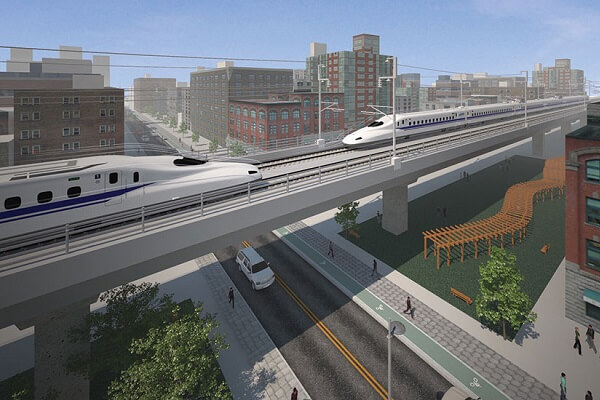 North-South Commuter Railway (NSCR): Modern Train Network Connecting Luzon Island
North-South Commuter Railway (NSCR): Modern Train Network Connecting Luzon Island India launched Bharat Taxi Service as First Cooperative-Owned Digital Mobility Platform
India launched Bharat Taxi Service as First Cooperative-Owned Digital Mobility Platform India places World’s First Live Commercial Order for Hyperloop-Based Cargo Logistics
India places World’s First Live Commercial Order for Hyperloop-Based Cargo Logistics How Weigh-in-Motion Systems Are Revolutionizing Freight Safety
How Weigh-in-Motion Systems Are Revolutionizing Freight Safety Women Powering India’s Electric Mobility Revolution
Women Powering India’s Electric Mobility Revolution Rail Chamber Launched to Strengthen India’s Global Railway Leadership
Rail Chamber Launched to Strengthen India’s Global Railway Leadership Wage and Hour Enforcement Under the Massachusetts Wage Act and Connecticut Labor Standards
Wage and Hour Enforcement Under the Massachusetts Wage Act and Connecticut Labor Standards MRT‑7: Manila’s Northern Metro Lifeline on the Horizon
MRT‑7: Manila’s Northern Metro Lifeline on the Horizon Delhi unveils ambitious Urban Mobility Vision: Luxury Metro Coaches, New Tunnels and Pod Taxi
Delhi unveils ambitious Urban Mobility Vision: Luxury Metro Coaches, New Tunnels and Pod Taxi Qatar approves Saudi Rail Link Agreement, Accelerating Gulf Railway Vision 2030
Qatar approves Saudi Rail Link Agreement, Accelerating Gulf Railway Vision 2030
Japanese Firm Hitachi Eyes Asian Rail Markets in Race with China

Tokyo, Japan (Urban Transport News): Japan's Hitachi Rail is making significant strides to enhance its presence in Asia's railway market following its recent acquisition of Thales Group's rail signal business on May 31. This strategic move comes as China continues to assert its dominance as a leading supplier of infrastructure projects in the region.
Hitachi, renowned for manufacturing Japan's iconic Shinkansen bullet trains, has been aggressively expanding its global footprint through a series of strategic acquisitions. Notable among these are the purchases of rail car maker AnsaldoBreda and signal maker STS from Italy's Finmeccanica in 2015, and more recently, the rail signal business from Thales Group. These acquisitions have enabled Hitachi to offer a comprehensive package that includes rolling stock, signaling, ticketing systems, and digital services, positioning it as a formidable competitor in the international rail market.
Giuseppe Marino, CEO of Hitachi Rail, emphasized the company's strengthened capabilities during a media roundtable. "We can offer a very integrated system that is connected," Marino stated. "Some customers want to buy a full 'key-ready' system, rather than having to purchase different systems from different suppliers."
Expanding Presence in Asia
While Hitachi has established strongholds in Japan, the U.K., and Italy, the acquisition of Thales' signal business, known as GTS, has opened new doors in markets such as France, Germany, and Canada. It also significantly boosts Hitachi's presence in Asia, particularly in Singapore and Malaysia, where the company has historically had a smaller footprint.
"Our Asia-Pacific footprint, after the integration [of GTS], is very, very strong," Marino said. The acquisition will bring approximately 160 new employees in Singapore and Malaysia, reinforcing Hitachi's regional operations. "Singapore has been very important for many years. We do see it as a very, very important market. We also see Malaysia growing quite extensively," Marino added.
Competitive Landscape and Strategic Moves
The global rail industry has been undergoing rapid consolidation, with significant mergers reshaping the competitive landscape. China's CRRC, formed by the merger of two major train manufacturers, is now the world's largest maker of rolling stock. In Europe, France's Alstom acquired the rolling stock business of Canada's Bombardier in 2020, following the European Union's blocking of a proposed merger between Alstom and Siemens' rail business.
In Southeast Asia, Hitachi faces stiff competition from China. Beijing has already developed a high-speed rail system in Indonesia and is currently constructing another in Thailand. State-owned CRRC is also among the contenders for developing a high-speed rail link between Kuala Lumpur and Singapore, a project that has not yet seen proposals from Japanese companies.
Despite the competition, Marino expressed Hitachi's interest in the Malaysian project. "We are scouting," he said, indicating the company's proactive approach to identifying and seizing new opportunities.
Eyeing India's Booming Market
India represents another crucial market for Hitachi. With its population now surpassing China's, India is on the cusp of significant infrastructure development, including its first high-speed rail link between Mumbai and Ahmedabad. Indian Prime Minister Narendra Modi, recently sworn in for a historic third term, is championing this ambitious project.
"India is a very important market. Its population is becoming No. 1," Marino noted. "Of course, we have an ambition to bring Japanese technology, shinkansen, to India. We have negotiations ongoing."
Future Prospects in Europe
While consolidating its presence in Asia, Hitachi is also setting its sights on Europe, particularly Germany. Despite having no rolling stock in Germany currently, Marino revealed Hitachi's aspirations to penetrate this lucrative market. "Germany is the largest rail market in terms of volume in Europe," Marino said. "Our ambition now, having a presence in Germany, is to put forward a proposal for our trains."
Hitachi's strategic acquisitions and expansions signify its commitment to becoming a global leader in the railway industry. By integrating advanced technologies and offering comprehensive, key-ready systems, Hitachi is well-positioned to compete with major players like China's CRRC, France's Alstom, and Germany's Siemens Mobility. As the company explores new opportunities in Asia, particularly in Singapore, Malaysia, and India, and aims to establish a foothold in Germany, Hitachi's ambitious plans could reshape the future of rail transportation worldwide.






